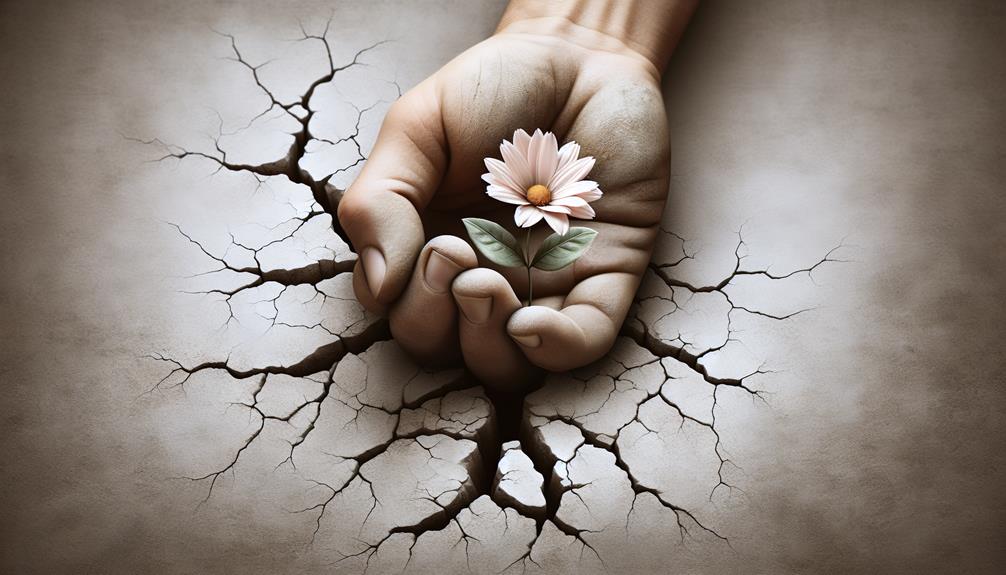Healing Wounds Nurturing Trust After Pain
In the aftermath of pain, the journey to rebuilding trust can be intricate and delicate. The complexities of human emotions and experiences intertwine, requiring a thoughtful approach towards healing wounds and nurturing trust. At the core lies the essence of understanding, resilience, communication, empathy, and forgiveness.
Healing Wounds Nurturing Trust After Pain
Each element contributes to the intricate tapestry of rebuilding trust after enduring pain. Trust, once fractured, holds the potential to mend stronger, but the path to healing is not without its challenges. It is within these challenges that the true essence of healing and trust-building unfolds, offering a profound opportunity for growth and renewal.
Healing Wounds Nurturing Trust After Pain
Key Takeaways
- Rebuilding trust requires acknowledging pain and fostering resilience.
- Effective communication and empathy are vital for healing wounds.
- Setting and respecting boundaries support trust and emotional well-being.
- Cultivating forgiveness nurtures deep connections and promotes healing.
Understanding Trust and Pain
In exploring the intricate relationship between trust and pain, it becomes evident that understanding the dynamics of both is essential in the healing process. Trust is the foundation upon which relationships are built, providing a sense of security, reliability, and support. When trust is broken, whether through betrayal, deception, or emotional hurt, it can lead to profound pain and distress. Pain, on the other hand, is a natural response to emotional or physical harm, signaling a need for attention and care.
Healing Wounds Nurturing Trust After Pain
The interplay between trust and pain is profound, as pain can erode trust, and the lack of trust can amplify pain. Healing from such wounds requires a delicate balance of acknowledging the pain, rebuilding trust, and fostering resilience. Individuals seeking to navigate this complex terrain must cultivate self-awareness, empathy, and communication skills to address the underlying causes of the pain and rebuild trust. By nurturing trust and understanding pain, individuals can embark on a journey towards healing and restoration, fostering stronger, more resilient relationships in the process.
Healing Wounds Nurturing Trust After Pain
Building Emotional Resilience
Developing emotional resilience is crucial in navigating life's challenges and setbacks, equipping individuals with the tools to bounce back from adversity. Emotional resilience allows individuals to adapt to stressful situations, maintain a positive outlook, and cope with hardships effectively. It is a skill that can be cultivated through various practices and mindset shifts.
Healing Wounds Nurturing Trust After Pain
Here are some key strategies to help build emotional resilience:
Healing Wounds Nurturing Trust After Pain
- Practicing self-care: Engaging in activities that promote well-being, such as exercise, mindfulness, and hobbies, can help individuals recharge and better cope with stress.
- Cultivating a support network: Surrounding oneself with caring and understanding individuals provides a sense of belonging and encourages open communication during tough times.
- Developing problem-solving skills: Learning how to identify challenges, brainstorm solutions, and take proactive steps can empower individuals to face adversity with confidence and resilience.
Cultivating Open Communication
To foster a culture of transparency and mutual understanding, cultivating open communication is essential in nurturing emotional resilience and building trust within relationships.
Healing Wounds Nurturing Trust After Pain
Open communication involves actively listening to others, expressing thoughts and feelings honestly, and being receptive to feedback. By creating a safe space for dialogue, individuals can share their vulnerabilities, fears, and aspirations, fostering deeper connections and fostering a sense of belonging.
Effective communication allows individuals to address misunderstandings promptly and constructively, preventing conflicts from escalating and creating emotional distance. It encourages empathy, validation, and respect for diverse perspectives, promoting harmony and cooperation within relationships. When individuals feel heard and valued, they are more likely to trust others and feel secure in expressing their authentic selves.
Moreover, open communication cultivates a sense of shared purpose and unity, reinforcing the bonds that hold individuals together during challenging times. By fostering a supportive environment where thoughts and emotions are acknowledged and respected, open communication paves the way for healing, growth, and resilience within relationships.
Practicing Empathy and Forgiveness
Practicing empathy and forgiveness is a cornerstone of fostering understanding and reconciliation in relationships. Empathy allows individuals to connect deeply with one another, acknowledging and validating each other's feelings. Forgiveness, on the other hand, enables healing by letting go of past hurts and moving forward with a renewed sense of trust and compassion.
Benefits of Practicing Empathy and Forgiveness:
- Enhances Emotional Connection: By empathizing with others, we build stronger emotional bonds and create a sense of belonging.
- Promotes Healing: Forgiveness releases the burden of resentment, paving the way for healing and restoration of relationships.
- Fosters Trust: Through empathy and forgiveness, trust is nurtured, creating a safe space for open communication and vulnerability.
In cultivating empathy and forgiveness, we pave the way for deeper connections and a more harmonious environment where individuals can feel supported, understood, and valued.
Honoring Boundaries in Healing
Respecting boundaries is fundamental to the process of healing and rebuilding trust in relationships. Boundaries serve as protective guidelines that safeguard our emotional and physical well-being, allowing individuals to feel safe and respected. In the context of healing, honoring boundaries is crucial for creating a supportive and nurturing environment where individuals can feel secure as they navigate through their pain and trauma.
When individuals establish and communicate their boundaries clearly, it fosters a sense of empowerment and autonomy in the healing process. Respecting these boundaries demonstrates a profound level of care and understanding, showing that their needs and limits are valued. It is essential to recognize that boundaries are unique to each person and may evolve over time as healing progresses.
Frequently Asked Questions
Can Past Traumas Affect Our Ability to Trust in Future Relationships?
Past traumas can indeed impact our ability to trust in future relationships. Experiences of betrayal, abuse, or neglect can create deep-seated fears and insecurities that affect how we view others.
These wounds may lead to barriers in forming connections and make it challenging to be vulnerable with new individuals.
Healing from past traumas is essential to rebuilding trust and fostering healthy relationships based on mutual respect and understanding.
How Can We Differentiate Between Healthy Boundaries and Walls That Prevent Us From Trusting Others?
Differentiating between healthy boundaries and walls that hinder trust involves understanding that boundaries are set to protect oneself while walls are used as barriers to emotional connection.
Healthy boundaries are flexible, allowing for openness and vulnerability within safe limits, fostering trust and respect.
Walls, on the other hand, are rigid and impenetrable, preventing genuine connections and hindering the development of trust.
Recognizing and maintaining healthy boundaries is essential for nurturing trusting relationships.
Are There Specific Techniques or Exercises That Can Help Individuals Build Emotional Resilience?
Building emotional resilience involves developing coping strategies and strengthening one's ability to bounce back from adversity. Techniques like mindfulness, cognitive reframing, and practicing self-compassion can help individuals cultivate resilience.
Additionally, engaging in regular physical exercise, seeking social support, and maintaining a healthy lifestyle can contribute to emotional well-being.
What Role Does Self-Forgiveness Play in the Healing Process and Rebuilding Trust?
Self-forgiveness serves as a crucial component in the healing process and trust rebuilding. It allows individuals to release self-blame and guilt, fostering self-compassion and acceptance.
By acknowledging mistakes and showing oneself forgiveness, one can begin to heal emotional wounds and rebuild trust within oneself and others.
Self-forgiveness acts as a bridge to inner peace, enabling individuals to move forward with a renewed sense of self-worth and resilience.
How Can Societal Factors, Such as Systemic Discrimination or Oppression, Impact an Individual's Ability to Trust Others?
Societal factors, such as systemic discrimination or oppression, can significantly impact an individual's ability to trust others. These external influences can create a sense of fear, vulnerability, and powerlessness, leading to a general mistrust of others.
Individuals from marginalized communities may face additional barriers in developing trust due to historical injustices and ongoing discrimination. Understanding these societal dynamics is crucial in addressing trust issues and fostering a more inclusive and supportive environment for all.
Conclusion
In conclusion, the journey towards healing wounds and nurturing trust after pain is akin to a delicate dance between vulnerability and strength.
By fostering emotional resilience, open communication, empathy, and forgiveness, individuals can honor boundaries in their healing process.
This intricate tapestry of emotions and experiences shapes the foundation of trust, allowing for growth and renewal in relationships.

